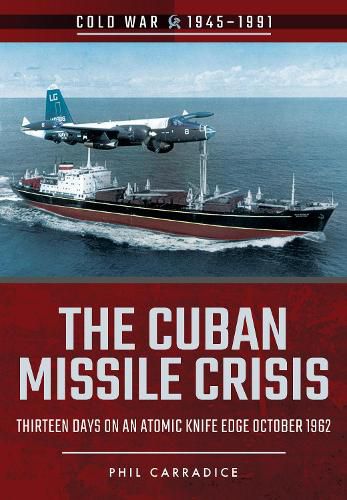Readings Newsletter
Become a Readings Member to make your shopping experience even easier.
Sign in or sign up for free!
You’re not far away from qualifying for FREE standard shipping within Australia
You’ve qualified for FREE standard shipping within Australia
The cart is loading…






When the world held its breath It is more than 25 years since the end of the Cold War. It began over 75 years ago, in 1944 long before the last shots of the Second World War had echoed across the wastelands of Eastern Europe with the brutal Greek Civil War. The battle lines are no longer drawn, but they linger on, unwittingly or not, in conflict zones such as Syria, Somalia and Ukraine. In an era of mass-produced AK-47s and ICBMs, one such flashpoint was the Cuban Missile Crisis The Cuban Missile Crisis of 1962 was the closest the world has yet come to nuclear war, a time when the hands of the Doomsday Clock really did inch towards the witching hour of midnight. By placing nuclear missiles on the Caribbean island of Cuba where, potentially, they were able to threaten the eastern seaboard of the USA, Nikita Khrushchev and the Soviet Union escalated the Cold War to a level that everyone feared but had never previously thought possible. In a desperate and dangerous game of brinkmanship, for thirteen nerve-wracking days Premier Khrushchev and President Kennedy held the fate of the world in their hands.Kennedy, in particular, wrestled with a range of options allow the missiles to stay, launch an air strike on the sites or invade Cuba. In the end, he did none of these but the solution to one of the deadliest dilemmas of the twentieth century proved to be a brave and dramatic moment in human history. AUTHOR: Phil Carradice is a poet, novelist and historian. He has written over fifty books, the most recent being ‘The Call-up: A Study of Peacetime Conscription in Britain’ and ‘Napoleon in Defeat and Captivity’. He presents the BBC Wales history programme The Past Master and is a regular broadcaster on both TV and radio. A native of Pembroke Dock, he now lives in the Vale of Glamorgan but travels extensively in the course of his work. Educated at Cardiff University and at Cardiff College of Education, Phil Carradice is a former head teacher but now lives as a full-time writer. 80 b/w and 40 colour images
$9.00 standard shipping within Australia
FREE standard shipping within Australia for orders over $100.00
Express & International shipping calculated at checkout
When the world held its breath It is more than 25 years since the end of the Cold War. It began over 75 years ago, in 1944 long before the last shots of the Second World War had echoed across the wastelands of Eastern Europe with the brutal Greek Civil War. The battle lines are no longer drawn, but they linger on, unwittingly or not, in conflict zones such as Syria, Somalia and Ukraine. In an era of mass-produced AK-47s and ICBMs, one such flashpoint was the Cuban Missile Crisis The Cuban Missile Crisis of 1962 was the closest the world has yet come to nuclear war, a time when the hands of the Doomsday Clock really did inch towards the witching hour of midnight. By placing nuclear missiles on the Caribbean island of Cuba where, potentially, they were able to threaten the eastern seaboard of the USA, Nikita Khrushchev and the Soviet Union escalated the Cold War to a level that everyone feared but had never previously thought possible. In a desperate and dangerous game of brinkmanship, for thirteen nerve-wracking days Premier Khrushchev and President Kennedy held the fate of the world in their hands.Kennedy, in particular, wrestled with a range of options allow the missiles to stay, launch an air strike on the sites or invade Cuba. In the end, he did none of these but the solution to one of the deadliest dilemmas of the twentieth century proved to be a brave and dramatic moment in human history. AUTHOR: Phil Carradice is a poet, novelist and historian. He has written over fifty books, the most recent being ‘The Call-up: A Study of Peacetime Conscription in Britain’ and ‘Napoleon in Defeat and Captivity’. He presents the BBC Wales history programme The Past Master and is a regular broadcaster on both TV and radio. A native of Pembroke Dock, he now lives in the Vale of Glamorgan but travels extensively in the course of his work. Educated at Cardiff University and at Cardiff College of Education, Phil Carradice is a former head teacher but now lives as a full-time writer. 80 b/w and 40 colour images